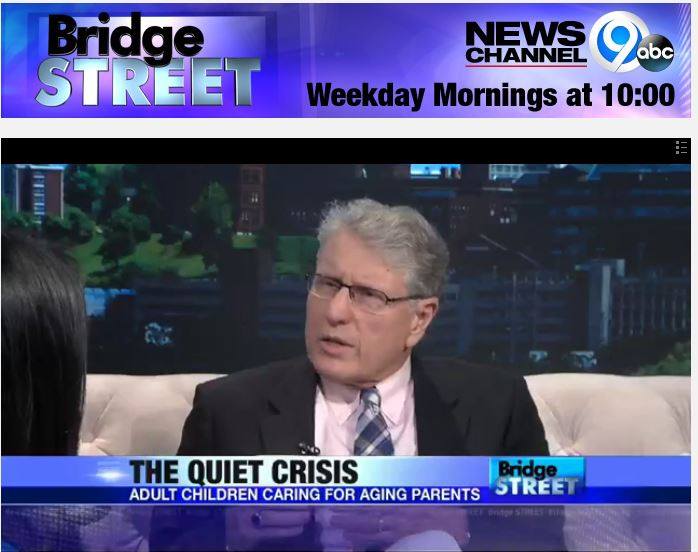 There is a quiet crisis spreading across our land which is not gaining much media attention: Adult children caring for aging parents.
There is a quiet crisis spreading across our land which is not gaining much media attention: Adult children caring for aging parents.
We know that changes in technology create changes in society that, in turn shake, things up socially. The problem is that it is difficult to recognize some of the emerging changes while they are occurring.
Currently, advances in medical science, which have added decades to our lives, have also created unintended problems for those who care for our aging population.
Specifically, our increase in longevity has also come about in the wake of the disappearance of the extended family. These two social shifts have created new challenges for caring for our seniors and have increased stress, for those adult children who are trying to take care of their parents. While this is a significant cultural problem, it seems to fly beneath the radar of most Americans and is not widely recognized.
Today I want to shed some light on this this growing crisis and to provide some basic information to help reduce the stress in your family. To begin, there are two levels which contribute to the distress of care givers:
Practical Factors
- Modern medicine has not only extended life expectancy it, has changed the arc of aging from a rapid and steep decline to a longer and more gradual one. This change has meant that, while folks are living in good health longer, they, nonetheless, are still losing abilities and require supportive services to remain active.
- The loss of the extended family structure, wherein several generations of family would live together or in close proximity, has removed a critical resource for providing care for our elderly. Today’s nuclear family structure, wherein families don’t live together and are more spread out, makes taking care of aging relatives is more complicated.
- Society always runs behind any technological advance and, in this case, most communities lack needed institutional supports for the aged. For example, as parents age they may still be quite active but reach a point where they are unable to drive. Sufficient public transportation is unavailable to many and means that family members are often called upon for rides to doctors or trips to the grocery.
The consequences of these changes and deficits is that adult children who are trying to fill in the care gaps for their parent are becoming physically and emotionally overwhelmed.
Psychological Conflicts
- Unrealistic expectations: People think they can or must do thing things which are beyond their capacity. This exaggerated sense of capabilities applies to both parents and their adult children.
- Guilt: A false sense of obligation results in self-recrimination when people are unable to accomplish their unrealistic goals or from parents who worry about being a burden on their children.
- Trouble setting limits and saying no: Adult children often feel that they must take care of their parents’ needs and that they don’t have the right to say no. Not setting reasonable limits can result serious marital and conflicts and feelings of resentment and bitterness in the caregivers.
With these factors in mind, here are some stress managing suggestions: https://revmichaelheath.com/first-aid-for-anxiety-part-ii-anticipatory-anxiety/
Tips for Reducing Stress
- Accept that we are in a cultural eclipse and, as a result of this in-between time, there are no simple easy solutions. The old way of caring for our elders is passing away but the new norms and guidelines have not been established.
- Start talking and planning ASAP. The earlier you start and farther away the time is when assistance is needed, the easier it is to have productive conversations and develop workable contingency plans. What used to take place spontaneously will now have to be the result of careful contingency planning and decision making. For example, it is important to look at options for getting around when the time comes that a parent can no longer drive.
- Learn about the adult services in your community. Onondaga County is blessed with both county and private supportive services but they are not well known. Find out which ones are available for your situation.
- Reality-test your assumptions and expectations and be specific. Parents need to ask: Can I really take care of myself all by myself? Adult children need to ask: Can I really do all that mom and dad need?
- Deal with the guilt. It is OK to have limits and say no. Caring for elderly parents needs to be reasonable and balanced so that it does not cause resentment and problems in your own life and family. Your family needs to come first. Saying no does not mean that you are a bad child.
Above all don’t give up. At times things can get ugly and unpleasant. This is normal. No one enjoys discussing giving up their independence or letting go of an important activity, like driving. It is important to be empathic and keep the conversation going. For more ideas: 40 Resources for Adult Children Caring For Aging Parents | Senior Lifestyle
Rev. Michel Heath, LMHC, Fellow AAPC 7 16 2021
These remarks are based on Rev. Michael Heath’s segment on Bridge Street 7 16 2014.



